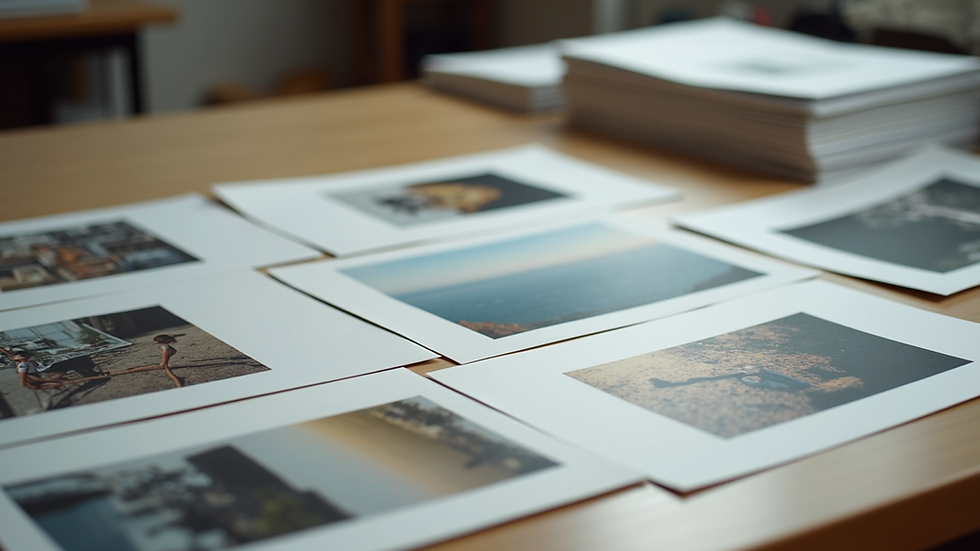Why Premium Photo Paper Matters for Art Prints
- W. K. Johnson
- Sep 9
- 4 min read
When it comes to creating art prints, the choice of paper can make all the difference. The right paper not only enhances the visual appeal but also ensures the longevity and quality of the artwork. Premium photo paper is a crucial element that artists and photographers should consider to elevate their prints from ordinary to extraordinary.
The Importance of Premium Photo Paper in Art Prints
Premium photo paper offers a superior surface that brings out the best in your artwork. Unlike standard paper, it is designed to handle high-resolution images with vibrant colors and sharp details. This type of paper typically has a thicker weight and a special coating that prevents ink from bleeding, resulting in crisp and clear prints.
Using premium photo paper can significantly impact the texture and finish of your art prints. Whether you prefer a glossy, matte, or satin finish, premium options provide a consistent and professional look. This consistency is essential for artists who want their prints to reflect the quality of their original work.
Moreover, premium photo paper is more durable. It resists fading and yellowing over time, which means your art prints will maintain their beauty for years. This durability is especially important for collectors and galleries that want to preserve the integrity of the artwork.

How Premium Photo Paper Enhances Color and Detail
One of the standout benefits of premium photo paper is its ability to enhance color accuracy and detail. The special coatings on this paper type allow inks to sit on the surface rather than being absorbed. This results in brighter colors and sharper images.
For example, when printing a landscape photograph, premium photo paper can capture the subtle gradients of the sky and the intricate details of foliage. This level of detail is often lost on lower-quality papers, where colors may appear dull or washed out.
Artists who work with fine art reproductions will notice that premium photo paper preserves brush strokes and textures, giving prints a more authentic feel. This is crucial for maintaining the artistic intent and emotional impact of the original piece.
Additionally, premium photo paper supports a wider color gamut, meaning it can reproduce more colors accurately. This is particularly beneficial for prints that require precise color matching, such as portraits or branded artwork.

Which Paper Quality Is Best for Photo Printing?
Choosing the best paper quality for photo printing depends on the type of artwork and the desired finish. Here are some common options and their characteristics:
Glossy Paper
Offers a shiny finish that enhances color vibrancy.
Ideal for photographs with high contrast and bright colors.
Can show fingerprints and glare under certain lighting.
Matte Paper
Provides a non-reflective surface with a smooth finish.
Great for fine art prints and black-and-white photos.
Reduces glare and fingerprints but may slightly soften colors.
Satin or Semi-Gloss Paper
Balances between glossy and matte finishes.
Offers vibrant colors with minimal glare.
Suitable for a wide range of art prints.
Fine Art Paper
Made from cotton or alpha-cellulose for archival quality.
Has a textured surface that mimics traditional art materials.
Best for limited edition prints and gallery exhibitions.
When selecting paper, consider the printer compatibility and the type of ink used. Some papers are optimized for dye-based inks, while others work better with pigment-based inks. Testing different papers with your printer can help determine the best match for your specific needs.

Practical Tips for Using Premium Photo Paper
To get the most out of premium photo paper, follow these practical tips:
Handle with Care: Always hold paper by the edges to avoid fingerprints and smudges.
Store Properly: Keep paper flat in a cool, dry place to prevent warping or moisture damage.
Use Correct Printer Settings: Adjust your printer settings to match the paper type for optimal color and quality.
Test Prints: Run test prints to check color accuracy and paper compatibility before final printing.
Consider Paper Weight: Heavier paper feels more substantial and professional but may require printer adjustments.
By following these guidelines, you can ensure that your art prints look their best and last longer.
Elevate Your Art Prints with the Right Paper Choice
Investing in premium photo paper is a smart decision for anyone serious about art prints. It not only improves the visual quality but also adds value to your work by ensuring durability and color fidelity. Whether you are printing limited edition pieces or creating gifts, the right paper can make a lasting impression.
For those looking to purchase high-quality photo paper, selecting a trusted supplier is key. Quality materials paired with the right printing techniques will help your art stand out and be appreciated for years to come.
Choosing premium photo paper is more than just a technical decision - it is an investment in the presentation and preservation of your creative vision. Make sure your art prints reflect the care and craftsmanship you put into your work by starting with the best paper available.





Comments